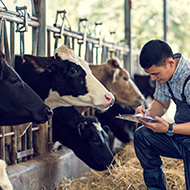Cattle vets announce new parasite policy

Parasite control in food-producing animals is full of challenges.
Plans to prioritise parasite control have been set out under a new policy announced by the British Cattle Veterinary Association (BCVA).
Parasite control in animals destined for human consumption is full of challenges - and endoparasiticide resistance is a serious threat that could damage the profitability and future health of the sector.
To help meet these challenges, the BCVA has developed a policy to help vets build the future of parasite control in livestock and support the long-term health of UK cattle. In the document, the BCVA outlines five key policy areas, including:
- Parasiticide (Anthelmintic) resistance in cattle and sheep
- Sustainability and soil health
- Safety & efficacy of parasiticides/anthelmintics and public perception
- Education and development of a new ethos
- Method of supply of parasiticides.
The policy sits alongside BCVA’s new sustainability statement and existing TB policy, with a focus on the role of the private farm vet and related industries.
Sally Wilson, who led the development of the policy alongside the BCVA Board, said: “We know that we need to encourage a shift from routine treatments to a diagnostic-led approach. BCVA is committed to contributing towards this shift.
“Our profession needs to be able to clearly demonstrate how clinicians balance the goal of preserving the effectiveness of parasiticides/anthelmintics with their health and welfare obligations to the animals under their care.”
BCVA president, Dr Elizabeth Berry added: “Training by the veterinary profession on medicine use with their clients has achieved considerable success recently, in both reducing and appropriate use of antimicrobials -around with initiatives like Farm Vet Champions taking this forward.
“Developing and extending this relationship with farm clients can lead to a similar focus on the use of parasiticides and we all need to be part of a change in attitude in use of parasiticides and consider animal health and our environment. We can be part of the solution.



 The Veterinary Medicines Directorate (VMD) is inviting applications from veterinary students to attend a one-week extramural studies (EMS) placement in July 2026.
The Veterinary Medicines Directorate (VMD) is inviting applications from veterinary students to attend a one-week extramural studies (EMS) placement in July 2026.